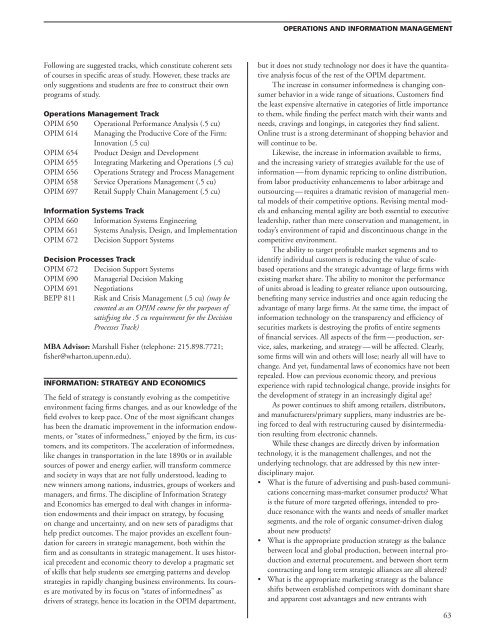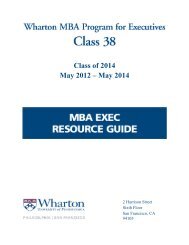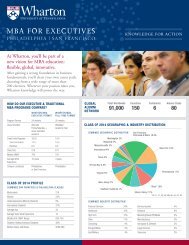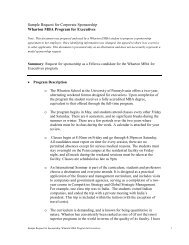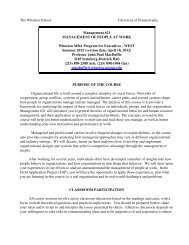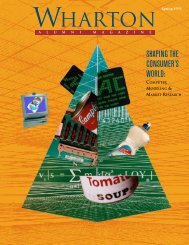Explore Options; Plan Your MBA Academic Program
Explore Options; Plan Your MBA Academic Program
Explore Options; Plan Your MBA Academic Program
Create successful ePaper yourself
Turn your PDF publications into a flip-book with our unique Google optimized e-Paper software.
Following are suggested tracks, which constitute coherent sets<br />
of courses in specific areas of study. However, these tracks are<br />
only suggestions and students are free to construct their own<br />
programs of study.<br />
Operations Management Track<br />
OPIM 650 Operational Performance Analysis (.5 cu)<br />
OPIM 614 Managing the Productive Core of the Firm:<br />
Innovation (.5 cu)<br />
OPIM 654 Product Design and Development<br />
OPIM 655 Integrating Marketing and Operations (.5 cu)<br />
OPIM 656 Operations Strategy and Process Management<br />
OPIM 658 Service Operations Management (.5 cu)<br />
OPIM 697 Retail Supply Chain Management (.5 cu)<br />
Information Systems Track<br />
OPIM 660 Information Systems Engineering<br />
OPIM 661 Systems Analysis, Design, and Implementation<br />
OPIM 672 Decision Support Systems<br />
Decision Processes Track<br />
OPIM 672 Decision Support Systems<br />
OPIM 690 Managerial Decision Making<br />
OPIM 691 Negotiations<br />
BEPP 811 Risk and Crisis Management (.5 cu) (may be<br />
counted as an oPiM course for the purposes of<br />
satisfying the .5 cu requirement for the Decision<br />
Processes track)<br />
<strong>MBA</strong> Advisor: Marshall Fisher (telephone: 215.898.7721;<br />
fisher@wharton.upenn.edu).<br />
INFORMATION: STRATEGy AND ECONOMICS<br />
The field of strategy is constantly evolving as the competitive<br />
environment facing firms changes, and as our knowledge of the<br />
field evolves to keep pace. One of the most significant changes<br />
has been the dramatic improvement in the information endowments,<br />
or “states of informedness,” enjoyed by the firm, its customers,<br />
and its competitors. The acceleration of informedness,<br />
like changes in transportation in the late 1890s or in available<br />
sources of power and energy earlier, will transform commerce<br />
and society in ways that are not fully understood, leading to<br />
new winners among nations, industries, groups of workers and<br />
managers, and firms. The discipline of Information Strategy<br />
and Economics has emerged to deal with changes in information<br />
endowments and their impact on strategy, by focusing<br />
on change and uncertainty, and on new sets of paradigms that<br />
help predict outcomes. The major provides an excellent foundation<br />
for careers in strategic management, both within the<br />
firm and as consultants in strategic management. It uses historical<br />
precedent and economic theory to develop a pragmatic set<br />
of skills that help students see emerging patterns and develop<br />
strategies in rapidly changing business environments. Its courses<br />
are motivated by its focus on “states of informedness” as<br />
drivers of strategy, hence its location in the OPIM department,<br />
OPERATIONS AND INFORMATION MANAGEMENT<br />
but it does not study technology nor does it have the quantitative<br />
analysis focus of the rest of the OPIM department.<br />
The increase in consumer informedness is changing consumer<br />
behavior in a wide range of situations. Customers find<br />
the least expensive alternative in categories of little importance<br />
to them, while finding the perfect match with their wants and<br />
needs, cravings and longings, in categories they find salient.<br />
Online trust is a strong determinant of shopping behavior and<br />
will continue to be.<br />
Likewise, the increase in information available to firms,<br />
and the increasing variety of strategies available for the use of<br />
information — from dynamic repricing to online distribution,<br />
from labor productivity enhancements to labor arbitrage and<br />
outsourcing — requires a dramatic revision of managerial mental<br />
models of their competitive options. Revising mental models<br />
and enhancing mental agility are both essential to executive<br />
leadership, rather than mere conservation and management, in<br />
today’s environment of rapid and discontinuous change in the<br />
competitive environment.<br />
The ability to target profitable market segments and to<br />
identify individual customers is reducing the value of scalebased<br />
operations and the strategic advantage of large firms with<br />
existing market share. The ability to monitor the performance<br />
of units abroad is leading to greater reliance upon outsourcing,<br />
benefiting many service industries and once again reducing the<br />
advantage of many large firms. At the same time, the impact of<br />
information technology on the transparency and efficiency of<br />
securities markets is destroying the profits of entire segments<br />
of financial services. All aspects of the firm — production, service,<br />
sales, marketing, and strategy — will be affected. Clearly,<br />
some firms will win and others will lose; nearly all will have to<br />
change. And yet, fundamental laws of economics have not been<br />
repealed. How can previous economic theory, and previous<br />
experience with rapid technological change, provide insights for<br />
the development of strategy in an increasingly digital age?<br />
As power continues to shift among retailers, distributors,<br />
and manufacturers/primary suppliers, many industries are being<br />
forced to deal with restructuring caused by disintermediation<br />
resulting from electronic channels.<br />
While these changes are directly driven by information<br />
technology, it is the management challenges, and not the<br />
underlying technology, that are addressed by this new interdisciplinary<br />
major.<br />
• What is the future of advertising and push-based communications<br />
concerning mass-market consumer products? What<br />
is the future of more targeted offerings, intended to produce<br />
resonance with the wants and needs of smaller market<br />
segments, and the role of organic consumer-driven dialog<br />
about new products?<br />
• What is the appropriate production strategy as the balance<br />
between local and global production, between internal production<br />
and external procurement, and between short term<br />
contracting and long term strategic alliances are all altered?<br />
• What is the appropriate marketing strategy as the balance<br />
shifts between established competitors with dominant share<br />
and apparent cost advantages and new entrants with<br />
63


